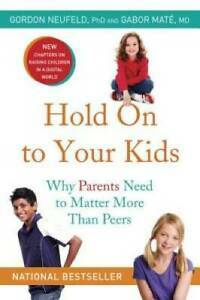Take a photo of a barcode or cover
196 reviews for:
Hold On to Your Kids: Why Parents Need to Matter More Than Peers
Gabor Maté, Gordon Neufeld
196 reviews for:
Hold On to Your Kids: Why Parents Need to Matter More Than Peers
Gabor Maté, Gordon Neufeld
hopeful
informative
inspiring
reflective
medium-paced
Provides meaning and insight into how parents and other well meaning adults can build/rebuild connections with the children in their lives. Can help adults gain awareness of their own attachment challenges, very practical for those in the mental health field.
slow-paced
challenging
emotional
hopeful
informative
medium-paced
challenging
informative
reflective
slow-paced
This is essentially a book about attachment parenting and what happens if children do not feel attached to their parents but seek their primary attachment from their friends.
However, the authors do not explain the basics of attachment parenting well enough to make their solutions be useful to parents who are unfamiliar with this parenting style.
Parts 1-3 are largely dedicated to problem statement and description. This can feel like an unabated flow of doom and gloom. I wonder how parents might feel who have already lost attachment to their child.
Suggested solutions are only presented from part 4 onwards. However they are not presented in a way that would be easy to implement for people unfamiliar with attachment parenting.
I suggest that anyone reading this book first get their bearings with attachment parenting with a more praxis oriented book, such as Listen by Patti Wipfler of Hand-in-Hand parenting.
“Hold on to you Kids” will make a lot more sense and be a valuable addition.
However, the authors do not explain the basics of attachment parenting well enough to make their solutions be useful to parents who are unfamiliar with this parenting style.
Parts 1-3 are largely dedicated to problem statement and description. This can feel like an unabated flow of doom and gloom. I wonder how parents might feel who have already lost attachment to their child.
Suggested solutions are only presented from part 4 onwards. However they are not presented in a way that would be easy to implement for people unfamiliar with attachment parenting.
I suggest that anyone reading this book first get their bearings with attachment parenting with a more praxis oriented book, such as Listen by Patti Wipfler of Hand-in-Hand parenting.
“Hold on to you Kids” will make a lot more sense and be a valuable addition.
challenging
hopeful
informative
inspiring
slow-paced
The content and message of the book are important, and make it a must read. However, I did find it contained a lot of repitition and could probably have lost 1/3 of the pages and still contained the same information.
hopeful
informative
reflective
medium-paced
informative
slow-paced
Best book on parenting.
Explains adolescence challenges, screen addiction, and children's attention disorders and misbehaviors. Shows it's origins, how to prevent and to revert.
Explains adolescence challenges, screen addiction, and children's attention disorders and misbehaviors. Shows it's origins, how to prevent and to revert.
Overall useful takeaways. Did not like the writing itself. V redundant.
I listened to the first 4 chapters of the book and then turned to the ebook to finish it as it was too hard to get anything out of the audio version for me. This book really forces us to challenge our ideas of what “good” parenting should look like. As an attachment based therapist, I found this book challenging a lot of my own views of parenting in the context of attachment. Reading some of the critics of this book makes me think that some don’t like this book simply because of how it challenges their notions of what should be. The authors take a “no apologies” “we are right, you are wrong” type of approach to writing this book, which I get can be hard to swallow at times. What I found to be helpful was to notice what triggered me to say “I don’t agree with that” and then to reflect on why. I learned a lot about myself and my views from doing that. For example, I feel like his ideas on how much we should let our kids be with other kids w/o parent interaction is a bit extreme. In his mind, parents need to always be there, which seems crazy to me! However, looking at it more seriously I can see how for me, I just need to be mindful of not going to either extreme. I hope others who read this can see that too (meaning not that specific idea, but how the challenging points of the book can be used to have them reflect on what matters to them as good parents).






